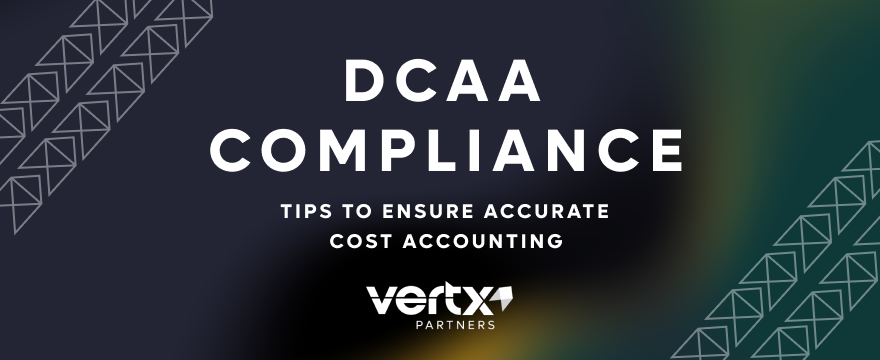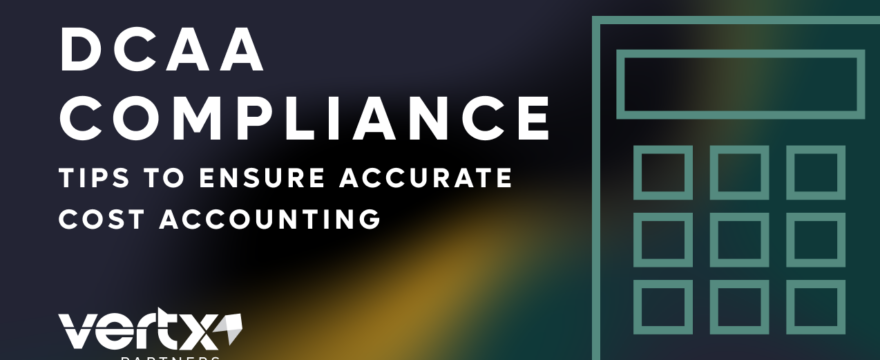DCAA compliance often trips up federal contracting newcomers. In this guide, we explain what DCAA compliance is and how to achieve it.

One of the most alluring aspects of the Small Business Innovation Research (SBIR) and Small Business Technology Transfer (STTR) programs – perhaps their most alluring aspect – is their promise to fund a small business’s technological potential.
Though the government issues these awards on a competitive basis, they are never simply a “blank check.” The extent to which the federal government audits them can vary drastically, ensuring that a small business’s financial work isn’t done when they are awarded.
So, who conducts these audits? And when do they conduct them?
What is the DCAA, and what is DCAA compliance?
DCAA stands for the Defense Contract Audit Agency, and it does exactly what it says on the tin: they’re an agency that audits defense contracts and, occasionally, defense contractors. They’re the preferred stop by the U.S. Department of Defense (DoD) and other federal agencies looking to ensure their investment dollars are seeing a satisfactory return.
To be DCAA compliant is to comply with the federal government’s comprehensive cost accounting regulations.
Since the DCAA is by far the largest auditor of government contracts, it’s a useful shorthand to describe accordance with these regulations as DCAA compliance. However, being DCAA compliant carries with it several connotations.
Basic principles of DCAA compliance:
- Allowability of Costs: This tenet of DCAA compliance aligns with the Cost Principles in Part 31 of the Federal Acquisition Regulation (FAR). Part 31 of FAR is comprehensive in its detail of what the government will cover directly/indirectly – what is allowable – and what it will not (unallowable). These costs include everything from labor and payroll costs to the actual costs of the proposal.
- Allocability of Costs: The next tenet of DCAA compliance aligns with Cost Accounting Standards (CAS). CAS concerns itself with measurability and allocability of costs; this is a complex procedure. However, there’s a bright side: most small businesses are exempt from specific CAS requirements, so you likely won’t endure this particular brand of arduous scrutiny.
- Reasonableness of Costs: The last tenet of DCAA compliance, reasonableness, is defined in FAR 31.201-3 as “in its nature and amount, it does not exceed that which would be incurred by a prudent person in the conduct of competitive business.” This codifies competitive business practices into legal jargon, which helps ensure that the federal government (and taxpayers) get the most bang for their buck. An actual DCAA auditor is the ultimate arbiter of reasonableness and can be a source of contention between the DCAA and the contracting firm.
An entity is said to be broadly DCAA compliant (more on the word ‘broadly’ later) when it satisfies the basic principles of allowability, allocability, and reasonableness. But even if your business is DCAA compliant, can you expect an audit? And what form will this audit take?
What types of audits does the DCAA perform?
The DCAA doesn’t audit every contract/contractor awarded an SBIR/STTR grant. Most Phase I SBIR/STTR awards are firmly fixed-price contracts exempt from any pre-award accounting system scrutiny, so there can be no auditing. Additionally, as long as the award is under $750,000, the DCAA limits its scrutiny.
Upon entering into a Phase II SBIR/STTR agreement, DCAA interactions become more complex. More on that later. Let’s examine the different types of DCAA audits:
- Pre-Award Audit: For this type of audit, the focus is on price proposals, forward costs, and indirect rates. For cost-reimbursement contracts, the pre-award audit often catches first-timers off-guard, thus representing their first financial hurdle.
- Post–Award Audit: The most common audit encountered here is the Incurred Cost Audit, which occurs during a cost-reimbursement contract after the contracting firm reports its end-of-year incurred cost. This is a way for the DCAA to ensure the reimbursement matches the proposed incurred cost. Other post-award audits may involve investigating Truth in Negotiations Act (TINA) and CAS compliance, but these are rare, particularly for small businesses.
- Contractor Business System Audit: This is an audit of the contracting firm’s accounting system, which may occur during or after the completion of a contract.
For most Phase I SBIR/STTR awardees, DCAA interaction is minimal. However, exchanges at the Phase II stage can prove both surprising and irritating, especially if the business firm still needs to prepare for its eventuality in the Phase I stage.
DCAA compliance re-examined
Earlier, we mentioned that the feds consider a business broadly DCAA compliant when it satisfies the basic principles of allowability, allocability, and reasonableness. Achieving these benchmarks gives a company a good chance of standing up to DCAA auditing, but the evaluative means by which this auditing occurs are a bit more complex than those three principles.
The DCAA follows a checklist for compliance called the SF1408 form. On this form are 14 criteria corresponding to a compliant accounting system. The DCAA will ask your business to demonstrate proficiency in these criteria when conducting its audit.
Three of the most critical criteria on this list are as follows:
- The ability of the accounting system to segregate direct project costs from indirect costs.
- The ability to further segregate direct costs by project.
- Implement a labor timekeeping and cost distribution system that accurately assigns labor costs to projects or as indirect.
Where businesses had some flexibility in the past to correct their systems if they weren’t immediately compliant, the standards are much stricter now. Today, the SF1408 form process is strictly pass/fail, making DCAA compliance a crucial hurdle toward achieving a successful federal contract.
Hopefully, the importance of DCAA compliance – at all stages of SBIR/STTR contracting – has impressed you. For many first-time and nontraditional contractors, DCAA compliance, particularly in the Phase II stage, is a hurdle they never overcome. Luckily, Vertx Partners employs a team of dedicated professionals at your disposal. Best of all, we offer our services free of charge.
Are you interested in federal contracting? Are you looking for a leg-up on the roadblocks that stump inexperienced bidders? Reach out to Vertx today and fill out our survey to find out how we can help you.
Become an Innovator With Us
Tell us about yourself, answer a few questions, and hit submit. It’s as easy as that to get started.
